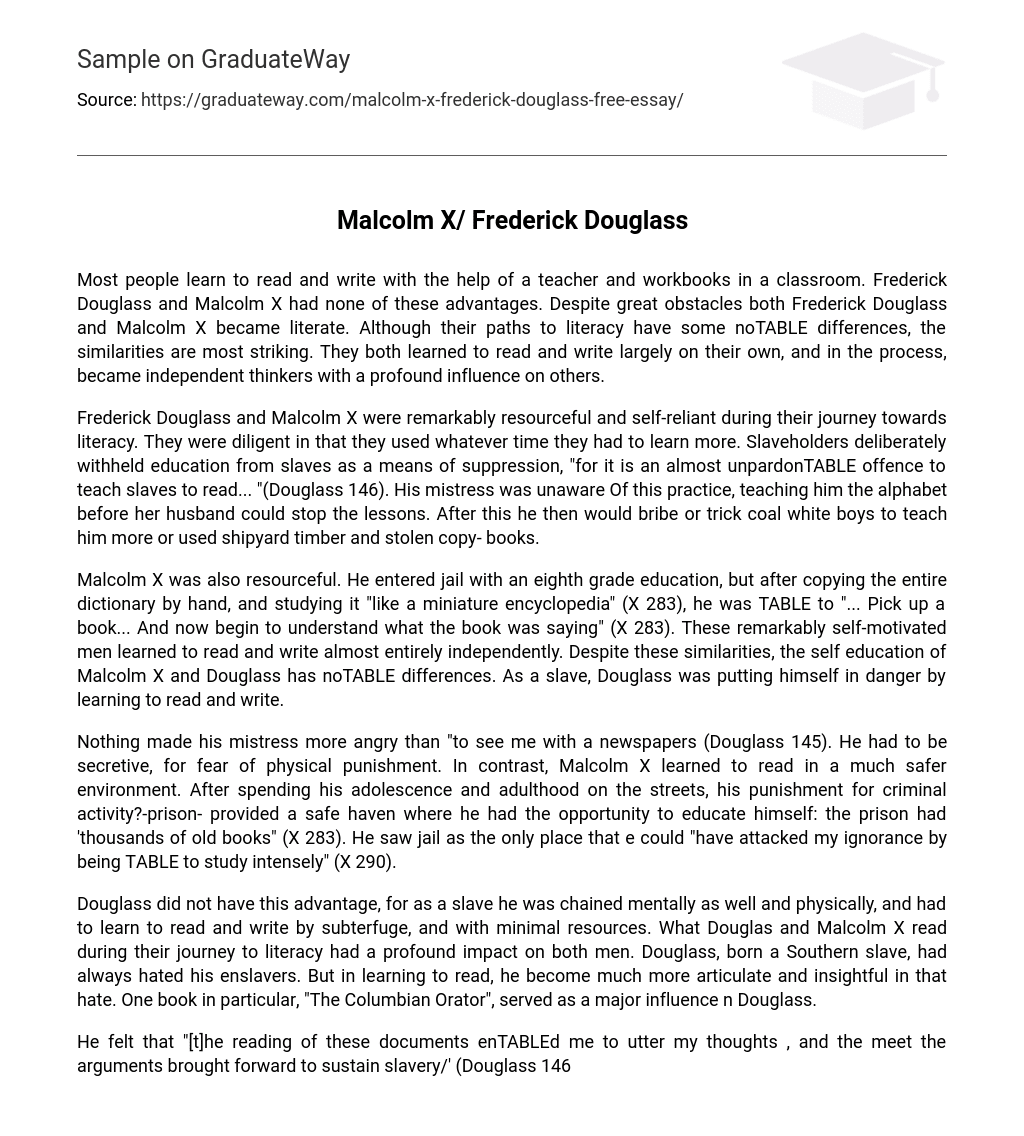Despite facing significant obstacles, both Frederick Douglass and Malcolm X managed to become literate without the assistance of teachers or workbooks in a classroom. Their paths to literacy differed in some ways, but what stands out the most are the similarities between them. Both individuals independently learned how to read and write, which ultimately cultivated their ability to think critically and had a profound impact on the people around them.
Frederick Douglass and Malcolm X exhibited great resourcefulness and self-reliance as they pursued literacy. Their diligent efforts involved utilizing any available time to expand their knowledge. Slaveholders deliberately denied education to slaves as a way to suppress them, as Douglass observes, “for it is an almost unpardonable offence to teach slaves to read” (Douglass 146). Despite this barrier, Douglass’s mistress unknowingly taught him the alphabet before her husband could intervene. Subsequently, Douglass resorted to bribing or deceiving young white boys into teaching him further. Additionally, he made use of shipyard timber and stolen copy-books to further his studies.
Malcolm X demonstrated resourcefulness by entering jail with only an eighth grade education, but he managed to expand his knowledge by meticulously copying the entire dictionary by hand and studying it extensively. This enabled him to comprehend books on a deeper level. Similarly, Douglass also pursued self-education, although as a slave, this act of seeking knowledge posed significant risks.
His mistress would become extremely angry when she saw him with a newspaper (Douglass 145), causing him to be secretive due to the fear of physical punishment. In contrast, Malcolm X had a safer environment in which he learned to read. Despite spending his youth and adult life on the streets, his punishment for criminal activity – prison – provided him with a secure space where he could educate himself. The prison offered an abundance of old books (X 283), allowing him the opportunity to study intensely and combat his ignorance (X 290).
Douglass did not have the advantage of being able to read and write freely like others, as he was both mentally and physically chained as a slave. He had to resort to subterfuge and utilized minimal resources to acquire literacy skills. The texts that Douglass and Malcolm X came across on their journey to literacy had a profound impact on both of them. Even though Douglass was born as a slave in the South, his hatred towards his enslavers became more articulate and insightful through his ability to read. “The Columbian Orator” in particular played a significant role in influencing Douglass.
He believed that reading these documents allowed him to express his thoughts and respond to arguments supporting slavery (Douglass 146). This knowledge made him agitated and resentful. This pattern continued, with his detestation for his enslavers increasing as he read more (Douglass 147). Eventually, Douglas discovered abolition and made the decision to escape to the North. Malcolm X came across the writings of black authors such as W. E. B. Du Bois, as well as Elijah Muhammad, a prominent black Muslim leader.
The teachings deeply influenced X, leading him to develop the belief that the collective white man behaved as a devil in nearly every interaction with the collective non-white man (287). Both men acknowledged this influence. It is evident that the literature they encountered during their journey to literacy greatly influenced their perspectives on slavery and injustice. As described earlier, they acquired reading and writing skills outside of formal education and became critical thinkers who played a significant role in advancing justice for African Americans.





